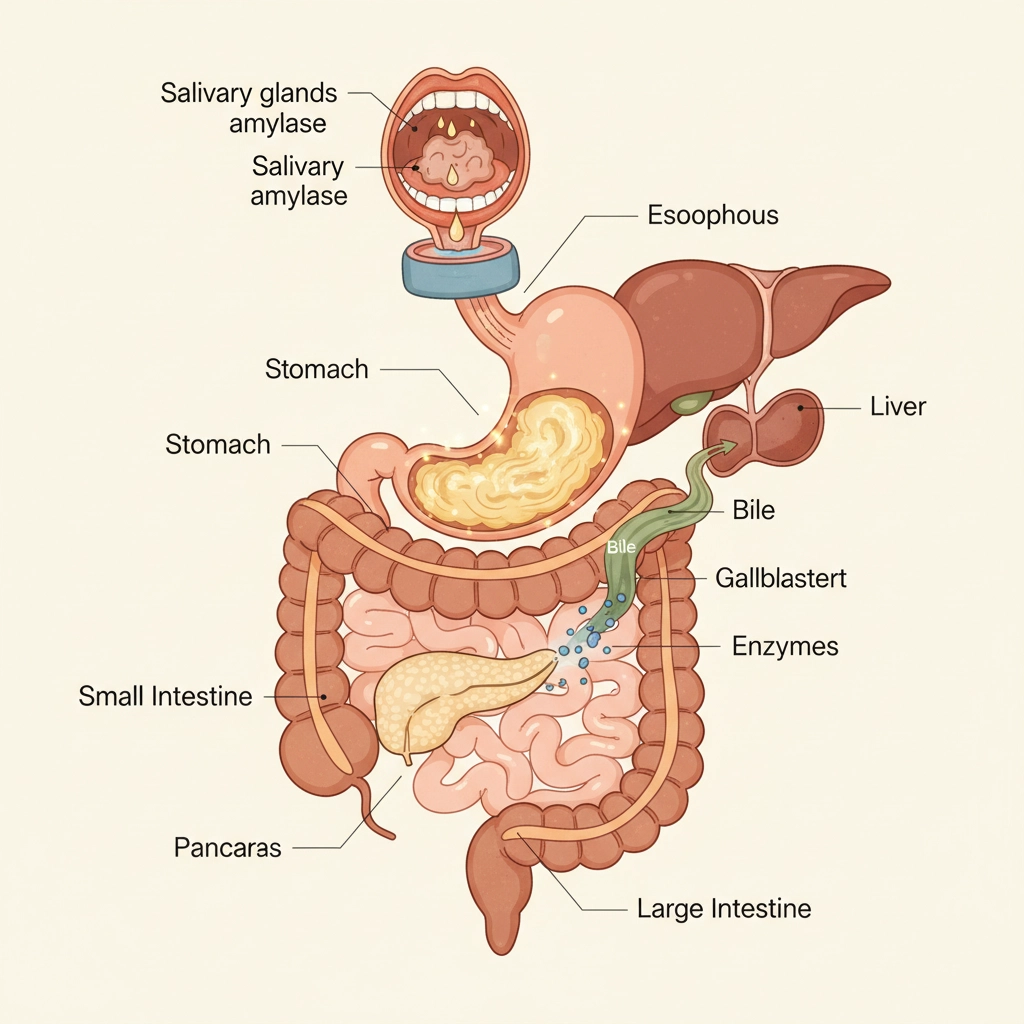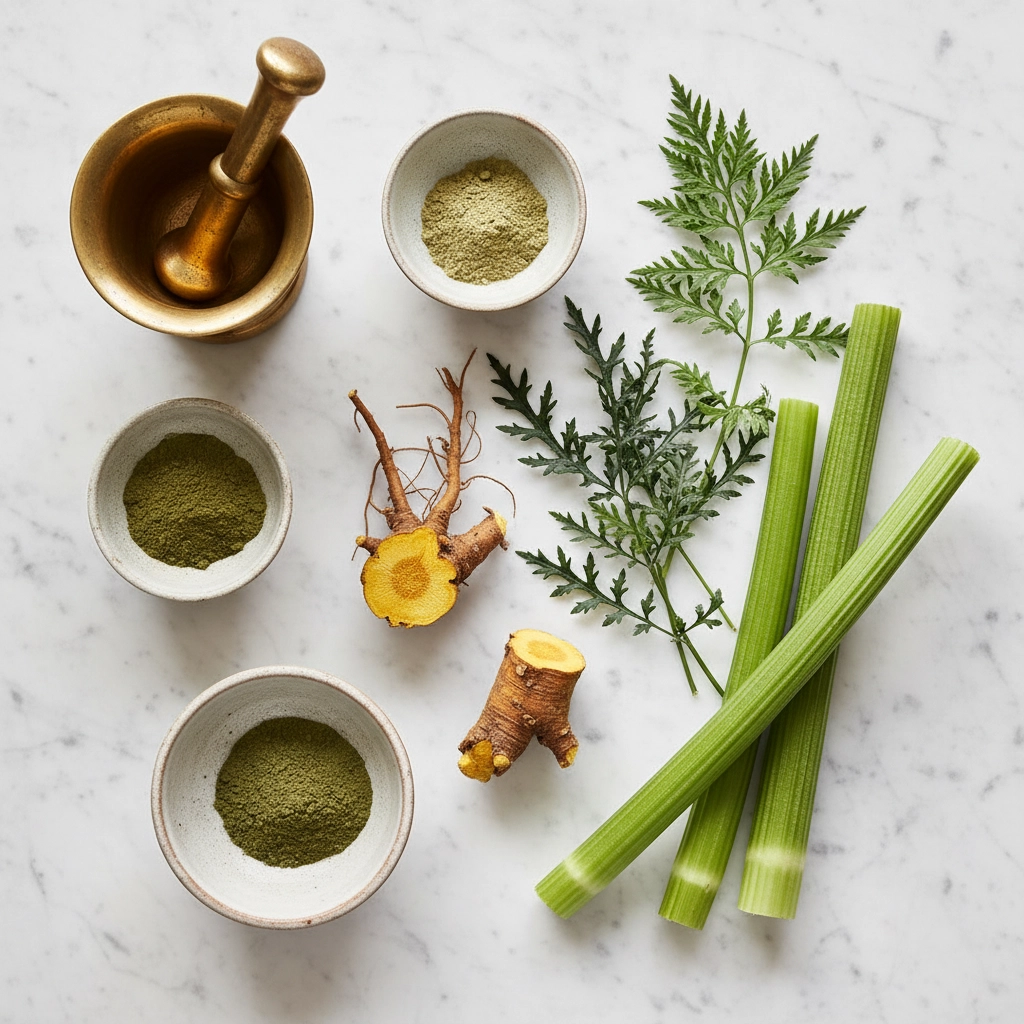Remember when your grandmother insisted on having a small glass of something bitter before Sunday dinner? Turns out she was onto something big. Digestive bitters, concentrated herbal extracts with that unmistakable sharp, bitter taste, have been quietly supporting healthy digestion for centuries. And now, they're making a comeback as people rediscover the simple wisdom of preparing their digestive system before each meal.
If you've never heard of digestive bitters or you're curious about whether they could help with your bloating, sluggish digestion, or that heavy feeling after meals, you're in the right place. Let's dive into what makes these botanical blends so effective and how they can transform your relationship with food.
What Are Digestive Bitters Exactly?
Digestive bitters are concentrated liquid extracts made from plants that naturally contain bitter compounds. Unlike the sweet or savory flavors we typically crave, these herbs pack a punch of pure bitterness that immediately gets your taste buds, and your digestive system, paying attention.
The magic happens the moment those bitter compounds hit your tongue. Your body recognizes this ancient signal and kicks off a cascade of digestive processes that have been hardwired into us for thousands of years. Think of bitters as a gentle wake-up call for your entire digestive tract.

How Your Body Responds to Bitter Tastes
When you taste something bitter, your body doesn't just sit there and take it. Within seconds, a remarkable chain reaction begins:
Your mouth springs into action. Saliva production increases dramatically, flooding your mouth with enzymes like amylase that start breaking down carbohydrates before you even swallow your food.
Your stomach gets the memo. The bitter taste signals your stomach to ramp up production of hydrochloric acid (HCl), which is absolutely essential for breaking down proteins and activating digestive enzymes like pepsin. This is huge if you're someone who struggles with low stomach acid, a surprisingly common issue that can cause heartburn, bloating, and poor nutrient absorption.
Your liver and gallbladder join the party. Bitters stimulate your liver to produce bile and encourage your gallbladder to release it. Bile is your body's natural fat emulsifier, breaking down dietary fats so you can actually absorb those important fat-soluble vitamins like A, D, E, and K.
Your pancreas pitches in. The bitter stimulus encourages your pancreas to release a full spectrum of digestive enzymes that tackle carbohydrates, proteins, and fats once they reach your small intestine.
This coordinated response is why taking bitters before a meal can make such a difference in how you feel afterward. You're essentially giving your digestive system a 15-minute head start.
The Real Benefits You'll Actually Notice
Say goodbye to that food coma feeling. When your body efficiently breaks down and processes food, you avoid that heavy, sluggish sensation that can hit after meals. Better enzyme production and stomach acid levels mean food moves through your system more smoothly.
Bloating becomes less of an issue. Poor digestion often leads to fermentation in your gut, which creates gas and bloating. By improving the initial breakdown of food in your stomach, bitters help prevent this uncomfortable buildup.
Your body actually absorbs nutrients. All the healthy foods you're eating won't do much good if your body can't break them down properly. Enhanced stomach acid and enzyme production means you'll get more vitamins, minerals, and other nutrients from every meal.
Heartburn relief that makes sense. This might sound counterintuitive, but many people with acid reflux actually have too little stomach acid, not too much. Bitters can help restore proper acid levels and strengthen the esophageal sphincter that keeps acid where it belongs.

Meet the Unique Bitter Herbs You Haven't Heard Of
While many people know about common digestive herbs like ginger or peppermint, the world of bitter herbs is filled with powerful plants that rarely get the spotlight they deserve.
Gentian Root is often called the "king of bitters" for good reason. This Alpine plant contains some of the most intensely bitter compounds found in nature. Gentian has been used in European folk medicine for centuries to stimulate appetite and improve overall digestive function. Just a small amount can trigger significant digestive activity.
Artichoke Leaf might surprise you, we're not talking about the hearts you eat, but the large, silvery leaves. These contain cynarin and other compounds that specifically support liver function and bile production. Artichoke leaf bitters are particularly helpful for people who struggle with fatty food digestion.
Angelica Root brings a complex, earthy bitterness that's been prized in both European and Chinese medicine traditions. It's especially known for its ability to ease digestive spasms and reduce gas formation, making it perfect for people who experience cramping after meals.
Oregon Grape Root offers a golden-yellow bitter extract that's particularly supportive of liver detoxification pathways. Unlike other bitter herbs that focus mainly on digestion, Oregon grape root helps your body process and eliminate toxins more efficiently.
Wormwood has an intensely bitter, almost medicinal taste that's incredibly effective at stimulating digestive juices. While it's famously associated with absinthe, medicinal preparations use much smaller, safer amounts that focus purely on digestive benefits.
How to Use Digestive Bitters the Right Way
The timing and method matter more than you might think. Most digestive bitters come as liquid tinctures, and the key is getting those bitter compounds onto your taste buds, that's where the magic starts.
Take them 10-15 minutes before meals. This gives your digestive system time to ramp up production of all those important acids and enzymes before food arrives. Don't wait until you're already eating or feeling uncomfortable.
Let them hit your tongue. Don't try to mask the bitter taste by mixing bitters into juice or swallowing them quickly. Place the drops directly on your tongue, let them spread around your mouth for a few seconds, then swallow. Yes, it's intense at first, but you'll get used to it.
Start small and build up. Most formulas suggest starting with just a few drops and gradually increasing to a full dropper or the recommended dose. Your taste buds and digestive system will adapt over time.
Be consistent. Like most natural approaches, bitters work best when used regularly rather than sporadically. Try to take them before your main meals for at least a few weeks to see the full benefits.

Practical Tips for Bitter Success
Make it a ritual. Set a phone reminder for 15 minutes before your usual meal times, or keep your bitters bottle somewhere you'll see it when you start cooking. Building the habit is often the hardest part.
Travel smart. Most bitter tinctures come in small, travel-friendly bottles. Keep one in your purse or work bag so you can maintain your routine even when eating out or traveling.
Pay attention to your body. Notice how different foods feel after you've been using bitters consistently. Many people report being able to enjoy foods that previously caused discomfort, like rich or fatty meals.
Don't expect overnight miracles. While some people notice benefits within a few days, others might need 2-3 weeks of consistent use to see significant improvements in their digestion.
Who Should Be Cautious
While digestive bitters are generally safe for most people, there are some situations where you should check with a healthcare provider first. People taking medications for diabetes should be cautious, as bitters can affect blood sugar levels. Those with gallstones should avoid bitters that strongly stimulate bile production. And if you're pregnant or nursing, it's always best to get professional guidance before adding new herbal supplements to your routine.
The Natural Approach That Actually Works
In our world of quick fixes and complicated solutions, digestive bitters offer something refreshingly simple: they work with your body's existing wisdom rather than trying to override it. By supporting your natural digestive processes, they help you get more from the healthy foods you're already eating while reducing the discomfort that can make meals stressful.
The bitter taste might take some getting used to, but most people find that the improvement in how they feel after meals makes it completely worth it. And unlike digestive aids that you take after problems start, bitters are all about prevention: setting your system up for success before each meal.
Whether you're dealing with occasional bloating, sluggish digestion, or you simply want to optimize how your body processes nutrients, digestive bitters offer a time-tested, natural approach that's as simple as a few drops on your tongue. Sometimes the old ways really are the best ways.





